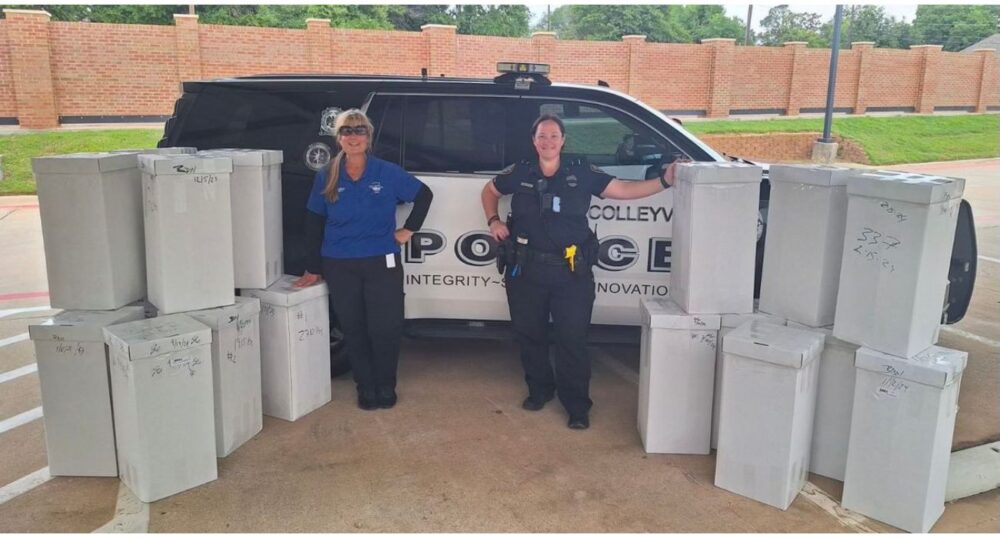The Colleyville Police Department collected a record-breaking 400 pounds of prescription drugs in their drug take-back event over the weekend.
Colleyville police partner with the United States Drug Enforcement Administration (DEA) to host prescription drug take-back events in April and October each year.
THANK YOU to everyone who made it out yesterday to National Drug Take Back Day! We ended the day with the highest weight (almost 400 pounds!!) we’ve collected in ALL the years we have partnered in this event! A big Thank You to Ofcr Beregszaszy & Kila for working the event! pic.twitter.com/mf0iQ160LZ
— Colleyville Police (@ColleyvillePD) April 28, 2024
As covered previously in The Dallas Express, National Prescription Drug Take Back Day is a nationwide initiative led by the DEA. The federal agency works alongside thousands of law enforcement agencies in an attempt to mitigate drug abuse and overdoses by providing people with a safe and trustworthy outlet to dispose of drugs.
Drug take-back events accept prescription medications, pet medications, patches, and vitamins.
“Responsible disposal of unused medication is an important step toward reducing the risk of child poisonings, drug abuse, water supply contamination, and other hazards,” explains the City of Colleyville on its website.
During the event, “medReturn” drug drop-off boxes are placed around the city, allowing residents to dispose of their prescription drugs in the drop box as if they were returning a library book. The drop-off is quick, anonymous, and an easy way to prevent prescription drugs from finding their way into the wrong hands and onto the streets.
The drug take-back program has removed nearly 18 million pounds of prescription medications across the country since the start of the program over a decade ago. Before this weekend, the DEA’s most recent take-back event in October of 2023 resulted in nearly 600,000 pounds of unneeded medications being collected among 4,675 drop-boxes nationwide.
Needles and syringes, inhalers, aerosol cans, hydrogen peroxide or other chemicals, thermometers, ointments, lotions, and liquids are not part of the drop-off program due to the possible health risks to workers. The DEA offers alternative methods for disposing of such materials.
For those who wish to dispose of unneeded medications outside of scheduled events, a permanent drop box is located in the lobby of the Justice Center at 5201 Riverwalk Dr. in Colleyville. This drop box is intended for use by Colleyville residents only. However, a drop-off location search engine for stations across the nation can be accessed here.
Prescription medications are major contributors to the ongoing opioid addiction crisis in Dallas, as previously reported by The Dallas Express. In November 2023, alongside numerous counties and local governments, Texas sued pharmaceutical manufacturers and distributors — such as Allergan, Johnson & Johnson, Walgreens, CVS, and Walmart — with settlement money funding opioid recovery initiatives statewide.
Yet prescription drugs are also directly linked to drug trafficking. Taking advantage of demand for prescription meds, illicit drug manufacturers create pills that have a similar appearances and effects to genuine pharmaceuticals, but often substitute in cheaper, more dangerous ingredients, especially fentanyl — a potent synthetic opioid.
North Texas has been flooded with the drug, as The Dallas Express has reported. In just one bust in late March, law enforcement raided a Dallas apartment, seizing more than 28,000 counterfeit pharmaceutical pills containing fentanyl.
Not only is fentanyl extremely addictive, but it is also deadly, with just 2 milligrams of the substance enough to prove lethal, per the DEA.
Texas Gov. Greg Abbott signed a set of laws last year that, in part, deemed fatal fentanyl overdoses as poisonings, increased punishments for fentanyl-related crimes, and mandated that schools teach a yearly lesson on fentanyl and drug abuse awareness.
Schools in North Texas and across the nation have reported an overdose epidemic among students, with fentanyl-laced prescription medications identified as the culprit behind many of the cases, some of which have been fatal and resulted in charges against dealers.
As of April 30, 3,179 drug-related arrests have been made in Dallas this year, according to the crime dashboard. Drug-related crimes include the possession, manufacturing, purchase, use, or transportation of illegal drugs. So far, there has been a 2.7% increase in drug-related arrests in the city since last year.

